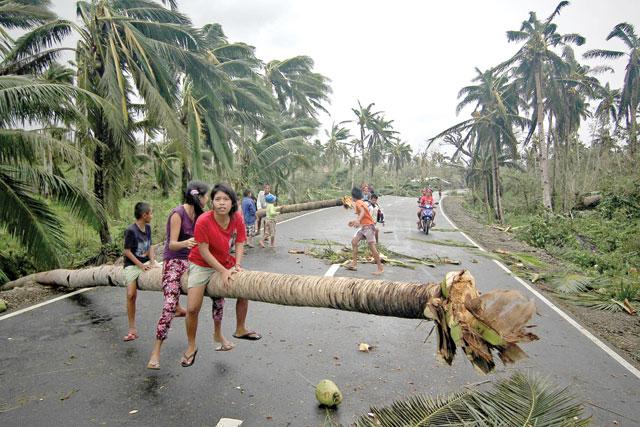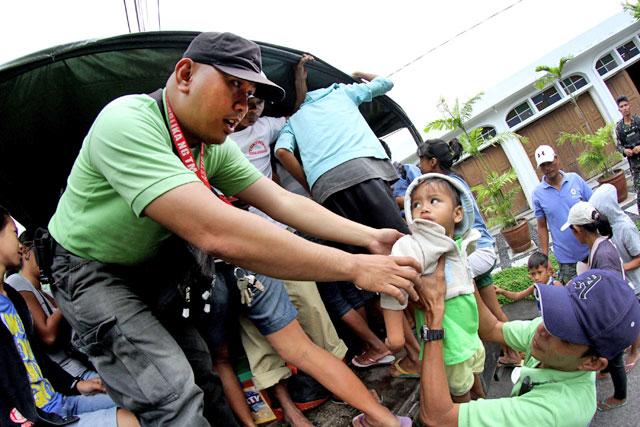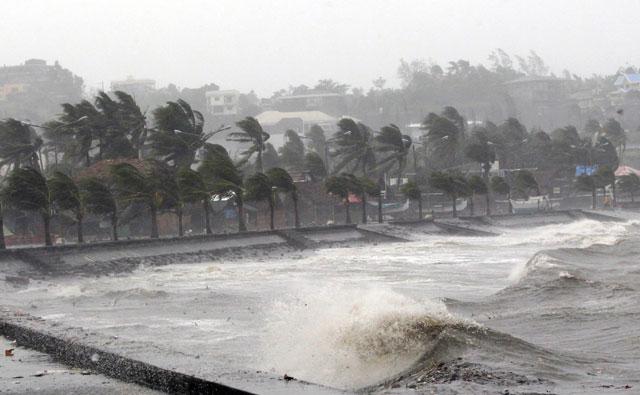You are here
Storm churns towards Philippine capital after killing at least 23
By AFP - Dec 08,2014 - Last updated at Dec 08,2014

MANILA — Millions of people in the Philippine capital hunkered down on Monday as a major storm churned towards the megacity, after claiming at least 23 lives while ripping apart homes in remote island communities.
Soldiers and aid workers rushed to reach devastated coastal villages on Samar Island, where Typhoon Hagupit crashed in from the Pacific Ocean at the weekend with winds of 210 kilometres an hour.
In Metro Manila, a sprawling coastal megalopolis of 12 million people that regularly endures deadly flooding, well-drilled evacuation efforts went into full swing as the storm approached on Monday.
“We are on 24-hour alert for floods and storm surges,” Joseph Estrada, mayor of Manila, the original city of 2 million within Metro Manila, told AFP.
Thousands of people, mostly the city’s poorest residents who live in shanty homes along the coast and riverbanks, crammed into schools and other government evacuation centres across Metro Manila.
“I’m very afraid. Every time there’s a storm we have no choice but to evacuate,” Soledad Papauran, 60, who works as a waste picker at a Manila landfill, said inside a school being used as an evacuation centre.
Across the megacity, schools were suspended, the stock market was closed, many office and government workers were told to stay at home, and dozens of commercial flights were cancelled.
Massive effort
The preparations were part of a massive effort led by President Benigno Aquino to ensure minimum deaths, after a barrage of storms in recent years claimed many thousands of lives.
The worst was Super Typhoon Haiyan, the strongest storm ever recorded on land, which claimed at least 7,350 lives as it devastated large parts of the central Philippines in November last year.
To avoid another massive death toll, millions of people in communities directly in the path of Hagupit were sent to evacuation centres or ordered to remain in their homes.
Hagupit, the strongest storm to hit the Philippines this year but significantly weaker than Haiyan, caused widespread destruction in remote farming and fishing towns on Samar and other eastern islands.
It has claimed at least 23 lives so far, with 18 of those deaths on Samar, Philippine Red Cross Secretary General Gwendolyn Pang told AFP.
Sixteen people drowned during flooding in Borongan, a city on Samar of about 60,000 facing the Pacific Ocean that was almost in Hagupit’s direct path, according to Pang.
Footage aired by local television network GMA showed children standing beside landslide-choked roads in Borongan on Monday carrying signs reading: “Help us,
help us.”
The death toll was widely expected to climb, with damage assessments from some badly hit areas yet to come in, and the storm not expected to fully cross the archipelago of 7,100 islands until Tuesday.
Still, the government was adamant that the preparation efforts had been a success.
“This is a good example of preparation and planning and of caring,” Interior Secretary Mar Roxas said while visiting Borongan on Monday, according to footage aired on GMA.
In Tacloban, a city of 220,000 people that was one of the worst-hit during Haiyan, authorities said there were no casualties over the weekend despite fierce winds that destroyed homes.
Hagupit steadily weakened after passing across Samar, Tacloban and other areas close to the Pacific. On Monday it was downgraded from a typhoon to a tropical storm while passing over open water.
As it made landfall again on Monday night at beach resort areas on the main island of Luzon 100 kilometres southwest of Manila, its winds were down to 85 kilometres an hour.
However, local weather agency Pagasa said the winds were still capable of doing major damage to homes, and heavy rain would likely fall within Hagupit’s 450-kilometre-wide weather front.
Climate change
The Philippines endures about 20 major storms a year, many of them deadly.
But scientists say the storms are becoming more violent and unpredictable because of climate change.
Greenpeace International Director Kumi Naidoo called on United Nations negotiators currently meeting in Peru to take note of Hagupit and act with more urgency to hammer out a world pact on global warming.
“Nature does not negotiate... we need to understand that we are running out of time,” Naidoo, who is in the Philippines to “bear witness” to Hagupit, told AFP.
Related Articles
A powerful typhoon roared into the eastern Philippines on Saturday, bringing lashing rain and strong winds that felled trees, ripped off tin roofs and toppled power lines in areas still bearing the scars of a super typhoon 13 months ago.
Typhoon Hagupit knocked out power, left at least three people dead and sent nearly 900,000 into shelters before it weakened Sunday, sparing the central Philippines the type of massive devastation that a monster storm brought to the region last year.
TACLOBAN, Philippines — Survivors of Super Typhoon Haiyan prayed for their dead loved ones in the devoutly Catholic Philippines on Wednesday
















